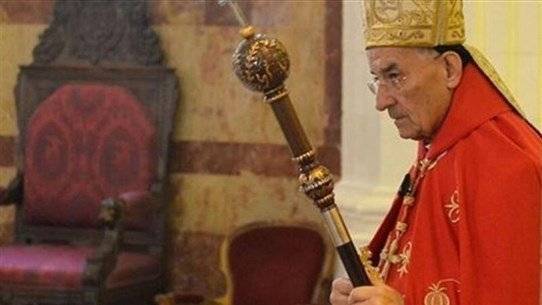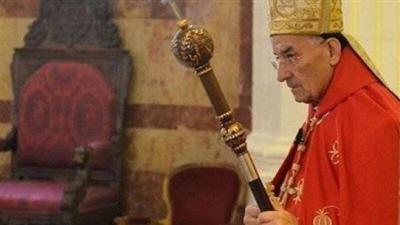Maronite Patriarch Cardinal Mar Bechara Boutros Raï presided over the Sunday Mass at the Lady Church in the patriarchal seat of Bkerke, assisted by Bishops Samir Mazloum, Hanna Alwan, and Antoine Awkar, as well as the patriarch's secretary Father Hadi Daw, Father Edmond Rizk, and participation from several bishops and priests, in the presence of Dr. Joe Saloum, head of the pharmacists' syndicate, lawyer Paul Joseph Kanaan, head of the "Maronites for Lebanon" electoral list for the executive council of the Maronite League, the family of the late Abbot Antoine Safir, the consul of the Republic of Mauritania, Elie Nassar, the honorary consul of Lebanon in Tuscany, Charbel Chebib, the Federation of Parents' Committees for Catholic Schools in Kesrouan-Ftouh and Jbeil, and a crowd of dignitaries and believers.
After the Holy Gospel, Patriarch Raï delivered a sermon titled "Your Faith Has Healed You... Just Believe," in which he stated: “For the bleeding woman who touched the hem of Jesus' garment, she was certain that if she did, she would be healed from her bleeding. And that is what happened. Jesus said, 'Take heart, daughter; your faith has healed you. Go in peace' (Luke 8:48). This is the silent faith that burned in her heart. And for Jairus, the synagogue ruler, who was informed while on his way with Jesus that his daughter had died and that there was no need to bother the teacher, Jesus said, 'Don't be afraid; just believe, and she will be healed' (Luke 8:50). This is the faith that 'hopes against all hope' (Romans 4:18).
It is clear from these two verses that God reads our hearts. Jesus read the faith of the bleeding woman who silently touched the hem of His garment, and her silent prayer spoke in her intention and action. He also read the faith of Jairus, who fell at His feet and begged Him to enter his house to heal his dying daughter. His spoken prayer stood firm in his unwavering faith when he learned of her death, and when Jesus called him not to fear but to stand firm in faith. Today, we implore God for the gift of faith and the spirit of prayer. They are our language with God."
He added: "We are pleased to celebrate this divine liturgy together, and I am particularly glad to greet all of you, especially the Federation of Parents' Committees for Catholic Schools in Kesrouan-Ftouh and Jbeil. I greet the Federation's president, Mr. Rafiq Fakhri, and the board members. I extend a special greeting to my brother fathers in the Maronite Lebanese Order, represented by the general vicar, Father Edmond Rizk. And to the family of the late Abbot Antoine Safir, the former general superior, whom we bid farewell to with much sorrow and hope three weeks ago. We offer this divine liturgy for the repose of his soul and for the comfort of the members of the Maronite Lebanese Order and his family and relatives."
He continued: "The bleeding woman represents every person who is suffering in their body, spirit, morals, or dignity. She represents every society that is suffering in its civilization, traditions, and values, and every homeland that is suffering in its sovereignty, identity, economy, security, and dignity. Her healing is a guarantee of healing for each one of us, and for our society and homeland. The woman quietly came from behind Jesus and among the crowd to touch the corner of His garment and be healed, as the old law considered a woman's bleeding as impurity, preventing her from touching anything lest it be defiled and preventing anyone from touching her lest they become impure (see Leviticus 15:25-27). Her faith compelled her to touch the hem of Jesus' garment, with the intention of healing. Intention is essential in prayer and in every good deed, as it defines the purpose and goal, and gives value and meaning to every prayer and action. It expresses the innermost thoughts of the heart and mind, and the internal will.
The bleeding woman did not violate the law by touching Jesus' garment. Instead, she came with faith to the Lord of the law because He is stronger than the letter of the law that kills. The law exists for humanity, not humanity for the law. Hence, Jesus wanted to reveal this as a lesson for all generations."
He added: "The resurrection of Jairus' daughter reveals a set of truths: the strength of Jairus' faith, known by Jesus, who knows the intentions of people. It reveals Jesus' faithfulness to His promise; thus, He continued on His way despite the death of the young girl. It shows God's incomparable gift. Jairus did not ask Jesus to raise his daughter from the dead, nor did he think of that. Instead, it was initiated by Jesus to show His human compassion, and to strengthen faith in Him and hope in His redemptive promise. It reveals Jesus' power, especially that He raises from spiritual and moral death, from sin and despair."
Patriarch Raï stated: "Citizens in Lebanon suffer not only from poverty, unemployment, and declining salaries, but also from a chaotic banking, economic, commercial, and tourist situation without oversight or deterrent. It seems that financial legislation in these sectors has also become independent from the laws of the state and from the laws of finance and credit. From the freezing of funds to loss of the dollar, to restrictions on withdrawals in Lebanese pounds, to money changers manipulating all currencies, to preventing transfers to cover necessities, to accepting credit cards with surcharges on invoices, to rejecting payment via credit cards, to enforcing cash payments. It is a financial, living, and social bleeding. The government cannot address this chaotic situation except by reviving the minimum financial system, controlling state revenues by collecting taxes and fees from everyone in all Lebanese regions, controlling airport and port revenues, stopping smuggling in and out, and investing state properties.
In this context, we have heard in recent days the cries of private school teachers. They currently seem unable to pay salaries due to banks' refusal to accept transfers from their accounts to the teachers' accounts. This makes schools incapable of fulfilling contracts with teachers and employees. This poses an existential threat to every school or institution that does not have sufficient liquidity to pay the salaries owed. At the same time, parents are not allowed to withdraw enough amounts to cover their monthly expenses, let alone their children's school fees. If parents do not withdraw sufficient cash, how can the school pay the salaries of teachers and employees? It is a vicious cycle they are all trapped in."
He added: "What is required from banks and the Central Bank of Lebanon is to consider school fees as a top priority, as they affect society, the future of the country, and education. It is therefore requested to enable educational institutions to settle their outstanding dues from the amounts previously deposited in their accounts, or by checks paid by parents, or transfers from the state or donor organizations. For any teacher or employee, how could they accept to work if they cannot obtain a salary that has already lost more than 90% of its actual value due to the collapse of the national currency’s exchange rate? And how can one continue to live without receiving cash funds? Also, in the educational sector, which is essential in shaping the Lebanese citizen's personality, we are keen that the recent Council of State ruling regarding the 'Center for Educational Research and Development' does not open the door to new disputes over the presidency of the center. It may offer some an opportunity to tamper with our Lebanese curricula derived from our culture and civilization formed around the Mediterranean Basin. It is essential to keep political ambitions away from education and to allow specialists to officially cooperate with educational stakeholders to develop national curricula suited to the educational and technological developments taking place in the world."
He emphasized that "Lebanon's neutrality, which is intrinsic to its identity and is based on avoiding entanglement in alliances, political conflicts, and regional and international wars, necessitates a strong state with a capable army and security forces to affirm its sovereignty internally and externally while respecting the sovereignty of other states, and repelling all aggression with its own forces. This neutrality makes Lebanon a bearer of a message. It sympathizes with human rights and freedoms of peoples, initiates reconciliation, resolves conflicts, and works for peace and stability.
In this context, and in the name of humanity and the millions of Ukrainian refugees to other countries walking toward the unknown with a small bag, and in the name of the victims and the dead on its soil and that of Russia, we condemn this Russian-Ukrainian war and demand its cessation. No outcome comes from it except killing, destruction, displacement, impoverishment, starvation, destruction of natural wealth, and sowing hatred and animosity. In the name of neutrality, we require the return of Syrian refugees to their homeland, so they can retain the wealth of their land, culture, and dignity, and continue writing their history. Their return is linked to a Lebanese, Arab, and international political decision, and their number has surpassed one and a half million, representing at least 35% of Lebanon's population. The absence of this decision now takes on the character of a conspiracy against Lebanon's entity, unity, identity, and security. Solving their issue requires urgency, especially with the outbreak of war in Ukraine and the emergence of new waves of displacement in Europe and the world."
Patriarch Raï concluded: "We raise our prayers to God, the source of all peace and human brotherhood, to instill peace in hearts, so that government leaders realize that their primary mission is to reinforce the foundations of internal and external peace. (Blessed are the peacemakers, for they shall be called sons of God) (Matthew 5:9). In peace on earth, the Holy Trinity—Father, Son, and Holy Spirit—is glorified now and forever. Amen."
After the Mass, Raï received the honorary consul, who briefed him on the stages of beginning the restoration of the new Mar Charbel Church in Florence.




